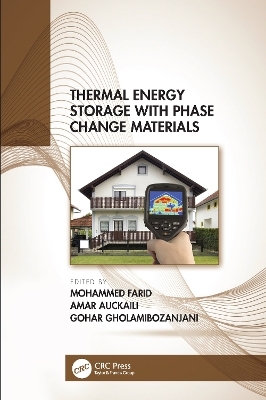
Thermal Energy Storage with Phase Change Materials
CRC Press (Verlag)
9780367567705 (ISBN)
This book focuses on latent heat storage, which is one of the most efficient ways of storing thermal energy. Unlike the sensible heat storage method, the latent heat storage method provides much higher storage density with a smaller difference between storing and releasing temperatures.
Thermal Energy Storage with Phase Change Materials is structured into four chapters that cover many aspects of thermal energy storage and their practical applications. Chapter 1 reviews selection, performance, and applications of phase change materials. Chapter 2 investigates mathematical analyses of phase change processes. Chapters 3 and 4 present passive and active applications for energy saving, peak load shifting, and price-based control heating using phase change materials.
These chapters explore the hot topic of energy saving in an overarching way, and so they are relevant to all courses. This book is an ideal research reference for students at the postgraduate level. It also serves as a useful reference for electrical, mechanical, and chemical engineers and students throughout their work.
FEATURES
Explains the technical principles of thermal energy storage, including materials and applications in different classifications
Provides fundamental calculations of heat transfer with phase change
Discusses the benefits and limitations of different types of phase change materials (PCM) in both micro- and macroencapsulations
Reviews the mechanisms and applications of available thermal energy storage systems
Introduces innovative solutions in hot and cold storage applications
Professor Mohammed Mehdi Farid is a full professor (Personal Chair) at the University of Auckland, New Zealand. Dr Amar Auckaili is a professional teaching fellow at the University of Auckland, New Zealand. Dr. Gohar Gholambozanjani is a research assistant at the University of Auckland, New Zealand.
1. Phase Change Material Selection and Performance 1.1 A Review on Phase Change Energy Storage: Materials and Applications 1.2 Fire Retardants for Phase Change Materials 1.3 Long-Term Thermal Stability of Organic PCMs 1.4 A Novel Calcium Chloride Hexahydrate-Based Deep Eutectic Solvent as a Phase Change Material 2. Mathematical Analysis of Phase Change Processes 2.1 A New Approach in the Calculation of Heat Transfer with Phase Change 2.2 Effect of Natural Convection on the Process of Melting and Solidification of Paraffin Wax 2.3 The Role of Natural Convection during Melting and Solidification of PCM in a Vertical Cylinder 2.4 Thermal Performance of a Heat Storage Module Using PCMs with Different Melting Temperatures: Mathematical Modeling 2.5 Performance of Direct Contact Latent Heat Storage Units with Two Hydrated Salts 3. Energy Saving, Peak Load Shifting and Price-Based Control Heating: Passive Applications 3.1 A Review on Energy Conservation in Building Applications with Thermal Storage by Latent Heat Using Phase Change Materials 3.2 Impact of Energy Storage in Buildings on Electricity Demand Side Management 3.3 Experimental Validation of a Methodology to Assess PCM Effectiveness in Cooling Building Envelopes Passively 3.4 Peak Load Shifting with Energy Storage and Price-Based Control System 3.5 Application of Weather Forecast in Conjunction with Price-Based Method for PCM Solar Passive Buildings – An Experimental Study 3.6 Application of PCM Energy Storage in Combination with Night Ventilation for Space Cooling 3.7 Application of PCM Underfloor Heating in Combination with PCM Wallboards for Space Heating Using Price-Based Control System 3.8 Analysis of Energy Requirements versus Comfort Levels for the Integration of Phase Change Materials in Buildings 3.9 Benefits of PCM Underfloor Heating with PCM Wallboards for Space Heating in Winter 4. Energy-Saving, Peak Load Shifting and Price-Based Control Heating and Cooling: Active Applications 4.1 Application of an Active PCM Storage System into a Building for Heating/Cooling Load Reduction 4.2 Peak Load Shifting Using a Price-Based Control in PCM-Enhanced Buildings 4.3 Model Predictive Control Strategy Applied to Different Types of Building for Space Heating 4.4 A Comparison between Passive and Active PCM Systems Applied to Buildings
| Erscheinungsdatum | 10.07.2023 |
|---|---|
| Zusatzinfo | 66 Tables, black and white; 251 Line drawings, black and white; 30 Halftones, black and white; 281 Illustrations, black and white |
| Verlagsort | London |
| Sprache | englisch |
| Maße | 156 x 234 mm |
| Gewicht | 453 g |
| Themenwelt | Naturwissenschaften ► Biologie ► Ökologie / Naturschutz |
| Technik ► Bauwesen | |
| Technik ► Elektrotechnik / Energietechnik | |
| Technik ► Maschinenbau | |
| Technik ► Umwelttechnik / Biotechnologie | |
| ISBN-13 | 9780367567705 / 9780367567705 |
| Zustand | Neuware |
| Informationen gemäß Produktsicherheitsverordnung (GPSR) | |
| Haben Sie eine Frage zum Produkt? |
aus dem Bereich


